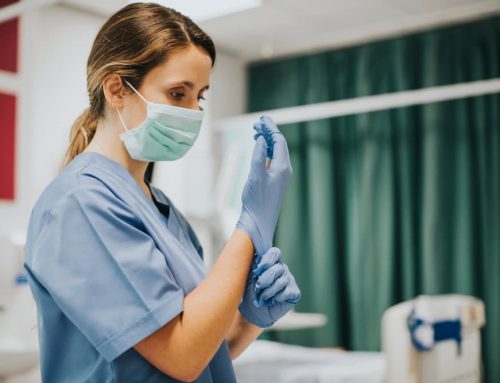Clinical molecular diagnostics (CMD) have forever changed healthcare, allowing clinicians to determine whether a patient has a gene mutation associated with a specific disease, whether inherited or acquired. Having this advanced knowledge leads to better treatment plans and patient outcomes.
The CMD field has exploded in the past decade. In addition to analyzing the genetic code for signs of disease, molecular diagnostics help create rapid diagnostic tests critical to reducing morbidity and mortality of infectious disease patients.
Northern Michigan University created its Master of Science in Clinical Molecular Diagnostics to give graduates the skills and knowledge they need to excel in this rapidly growing field. The university offers a primarily online program for laboratory science professionals with training in medical laboratory work or a related discipline.
Many professionals aspire to a career in CMD because of its increasing importance in healthcare. The American Society of Microbiology writes that “molecular pathology and diagnostics are extending the range of information available to physicians, pharmacists, geneticists, forensic scientists, research scientists, and other healthcare professionals.”
Dr. Matthew Jennings, Assistant Professor and CMD program director at NMU, said the degree program provides students with the foundational knowledge to compete for clinical laboratory, research, biotechnology, and pharmaceutical positions.
“Our students are prepared to participate in the rapidly evolving molecular diagnostics field that identifies the human condition as it relates to infectious disease and mutations associated with cancer,” Jennings said.
What Is Clinical Molecular Diagnostics?
CMD focuses on precision in healthcare by examining patients at the molecular level. CMD involves taking the unique genetic code found in cells (DNA or RNA). Analyzing these code sequences for red flags can indicate the potential emergence of specific inherited or acquired diseases. Diagnostic experts can test for inherited diseases at the prenatal, newborn, and adult stages of life.
A few years ago, the general public may have only known about molecular diagnostics through consumer-facing services such as DNA tests offered to trace ancestry. Millions more became aware of molecular biology with the Messenger RNA (mRNA) vaccines used to combat COVID-19. The vaccines teach cells how to make a protein that triggers an immune response.
Expansion of CMD Field
The potential number of RNA and DNA tests has expanded rapidly in the last decade. Part of that expansion is due to completing the Human Genome Project, involving a team of international scientists sequencing and mapping all the genes in homo sapiens. Completion of the project, which ran from October 1990 to April 2003, gave humanity a complete genetic blueprint for a human being for the first time.
Today, medical professionals and researchers use CMD in a wide variety of ways.
- Checking newborns for the two gene mutations associated with cystic fibrosis allows early treatment that can prolong their lives.
- Finding mutations that indicate common inherited cancers, such as breast cancer or ovarian cancer.
- Detecting common acquired diseases, such as chronic myeloid leukemia, allows for early treatment.
- Testing to see if a patient has become resistant to certain types of drug treatments, such as those that treat HIV.
The use of CMD continues to expand, including testing for genetic disorders, infectious diseases, cancer, pharmacogenomics, and identity testing. Also, as reported by Clinical Lab Manager, emerging technology for use in nucleic acid amplification tests (NAATs) enables testing “for an array of infectious diseases including SARS-CoV-2 and globally prevalent sexually transmitted infections.”
The development of such tests is part of the NMU student research in the master’s degree program. The NMU program also includes prokaryotic cell-focused courses. Enzymes derived from the prokaryotic immune systems target viruses.
The NMU CMD Program
NMU designed its MS in Clinical Molecular Diagnostics program for working professionals. The flexible program allows for online or on-campus degree completion and features active web-based courses and an optional week-long on-campus laboratory experience.
Offered through NMU Global Campus, the program provides graduate students the chance to develop expertise in clinical applications for molecular genetic tests for acquired, inherited, and infectious diseases.
Students can choose between two concentrations: infectious disease or human genetics. The program prepares graduates for a career in healthcare, biotechnology, pharmaceuticals, forensics, research, and academia.
All students take courses in Principles of Clinical Molecular Genetics, Research Design and Methods, CMD Techniques, Molecular Diagnostics in Identity Testing, and Clinical App of Genomic Medicine. Students in the infectious disease concentration take courses that include:
- Molecular Identification of Viral and Fungal Pathogens
- Molecular Identification of Bacterial Pathogens
Those in the human genetics concentration take courses that include:
- Clinical Genetics
- Molecular Identification of Somatic Mutations in Cancer
Graduates from the program will take an active role in the ongoing healthcare movement to provide more precise, evidence-based care that leads to better patient outcomes.
“A Clinical Molecular Diagnostics Master’s degree from NMU opens the door for advancement in numerous laboratory and medical careers in a flexible online format that allows for investigation into applications of molecular technologies in a clinical setting,” said Jennings. “The degree allows opportunities for students to explore cutting edge technologies, making them desirable candidates for the workplace.”







